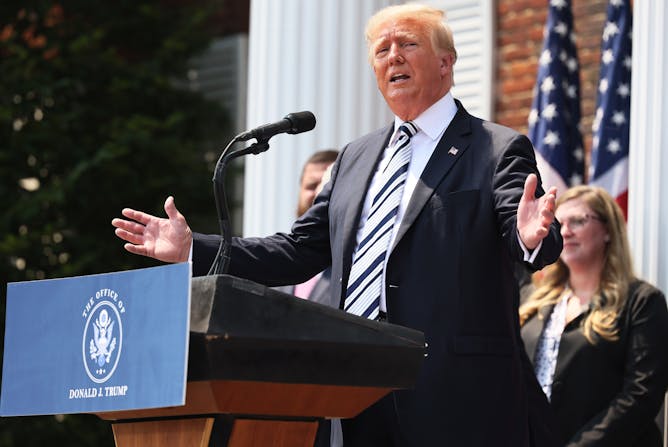|
A dozen years ago, I was part of an early wave of journalists whose newspapers were bought and who – after massive newsroom cuts – found themselves without the job they loved. I ended up leaving journalism, which was hard for me, and taking a job at an advocacy organization. Before I started, my husband and I took a short vacation in Washington, D.C., which is the kind of place journalists think makes for a fun holiday.
As we walked down the Mall and headed toward the (now closed) journalism museum called the Newseum, I looked up at the building and saw inscribed on its side, “Congress shall make no law respecting an establishment of religion, or prohibiting the free exercise thereof; or abridging the freedom of speech, or of the press; or the right of the people peaceably to assemble, and to petition the Government for a redress of grievances.” I burst into tears. That’s the First Amendment, and I cared deeply about the meaning of those words, had fought during my career for “freedom of speech, or of the press” and couldn’t bear the thought of leaving the career that had so inspired me.
As you can see, I got back to journalism, and one of the things that I love, still, is a good First Amendment story. We have that for you this week, in an article by Frank LoMonte at the University of Florida’s Brechner Center for Freedom of Information. A former journalist, a lawyer and a First Amendment expert, LoMonte writes that former President Donald Trump, in his lawsuits against Facebook, Twitter and YouTube for kicking him off their platforms, is “asking the courts to do what tycoon Trump once would have denounced: tell some of America’s most powerful corporations that they have no choice who they do business with.” LoMonte writes, “I believe the former president knows he can’t win in court.” But that may not be the reason Trump mounted the lawsuits.
Also in the past week in politics:
|

Donald Trump at a press conference to announce a class action lawsuit against Facebook, Twitter, Google and their CEOs.
Michael M. Santiago/Getty Images
Frank LoMonte, University of Florida
Former President Trump is asking the courts to do what tycoon Trump once would have denounced: tell some of America’s most powerful corporations that they have no choice who they do business with.
|

Secretary of Defense Lloyd Austin, center, greets Gen. Scott Miller, the former top U.S. commander in Afghanistan, upon Miller’s July 14, 2021, return to the U.S. at Andrews Air Force Base in Maryland.
Alex Brandon - Pool/Getty Images
Mark Jacobson, Syracuse University
A scholar and practitioner of foreign policy and national security offers personal and professional perspectives on the US withdrawal from Afghanistan.
|

A rare unauthorized public gathering in Havana on July 11, 2021. Some demonstrators on the streets that day chanted ‘Down with the dictatorship.’
Yamil Lage/AFP via Getty Images
Catesby Holmes, The Conversation
Experts explain the recent history behind the rare public outpouring of anger in Cuba.
|
|
|
-
Patrick D Bellegarde-Smith, University of Wisconsin-Milwaukee
President Moïse is dead. Two politicians say they're in charge. Parliament is suspended. A Haitian studies scholar explains Haiti's power vacuum and says elections alone won't restore democracy there.
-
Rosalyn R. LaPier, The University of Montana
Native Americans have long struggled to practice their spiritual rituals and protect their landscapes. Crackdowns on Indigenous protests could further erode the free exercise of their religions.
-
Jelani M. Favors, Clayton State University
The training center, which welcomed Rosa Parks and John Lewis before they became famous, still empowers and inspires marginalized Americans to use their own voices and talents.
-
Vinodh Venkatesh, Virginia Tech
In Latin America, common citizens have often donned outlandish outfits and comic book-inspired personas to lead demonstrations and promote social change.
-
Emily Schwartz Greco, The Conversation
Experts explain the significance of this new 'allowance.'
|
|